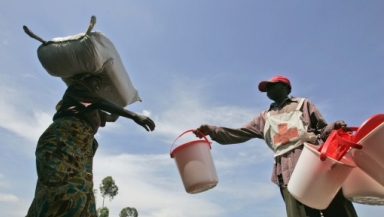
The province of Katanga in southern Democratic Republic of Congo (DRC) is degenerating into a humanitarian crisis, Christian Aid has warned.
UN officials say more than 400,000 people have been displaced as a result of fighting between government troops and Mai Mai and Bakata Katanga rebels.
Christian Aid said violence had intensifed since January and that its partners on the ground have recorded a doubling in the number of internally displaced people in Pweto territory, from 59,000 to just under 128,000.
Pweto forms together with Mitwaba and Manono territories what has been dubbed the 'triangle of death' due to the level of violence.
Salome Ntububa, Christian Aid's Regional Emergency manager for Central Africa, said the situation was "desperate" and that there was no police station or even military post in any of the villages she has visited. In Pweto territory, she heard reports of only nine government soldiers being on hand to protect more than 6,000 unarmed civilians.
The humanitarian needs are great as people have fled with only the clothes on their backs, she says, while most families do not have the money to buy shelter or basic provisions like bedding, firewood or medication.
Families forced from their homes have had to resort to living in temporary shelter. Around a thousand families are being looked after by Christian Aid partners the Lutheran Evangelical Church in Congo (EELCO) and the Consortium of Economist of the Civil Society in Katanga. In addition to shelter, they are being given hygiene kits, clothing, blankets, cooking utensils and soap.
Christian Aid warned that the conflict has led to widespread malnutrition, with children under the age of 14 eating at the most only one small meal per day.
While clashes between rebel groups have surged in recent weeks, Ntububa said the government forces were too small to keep them in check, jeopardising the delivery of aid.
"The situation in Katanga is desperate - we are on the verge of a humanitarian crisis unless drastic emergency measures are taken now," she said.
With people being forced to drink from polluted rivers, Ntububa said the threat of malaria, diarrhoea and cholera was "huge".
Girls face an additional risk of sexual exploitation.
"As the vital crop-planting season fast approaches there is a real fear that young women and girls will be forced to turn to prostitution in order to feed their families and to survive, raising serious concerns about HIV infection rates," she explained.
"Only ten per cent of parents in the region can now afford to send their children to school and many people are having to sell their bicycles, and even shoes, in order to buy food, while some are being forced to resort to begging."













